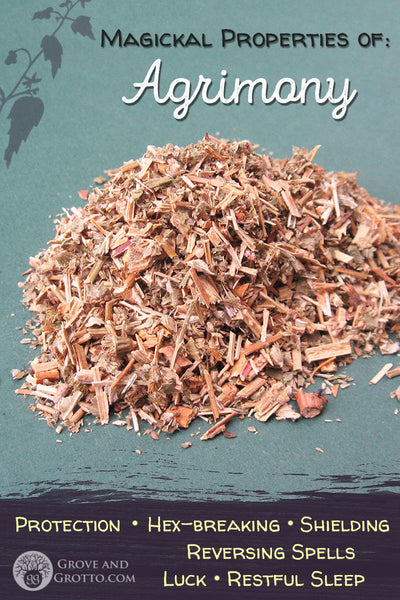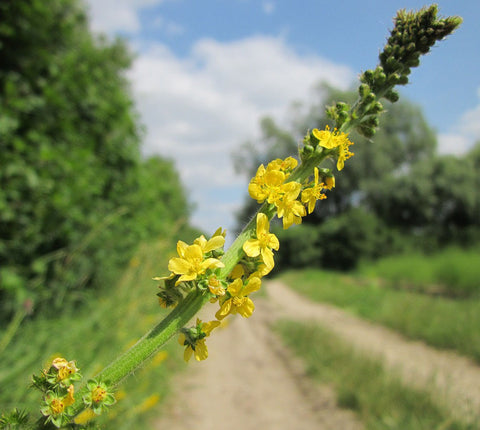
Agrimony is a tall, perennial herb with yellow flowers. It grows abundantly in England, Europe, and parts of North America. Agrimony is the common name for several different species of Agrimonia. The folkloric name is Cocklebur. All are distantly related to the Rose.
Agrimony was known to the ancients as a heal-all tonic, easing everything from cataracts to sore feet. The herb was steeped in baths or consumed as a tea. Nicholas Culpeper's Complete Herbal (1653) recommends cleansing sores with an infusion of Agrimony. Agrimony tea is sometimes taken as a refreshing Spring beverage.
The occult legacy of Agrimony is harder to trace. Its protective reputation may be related to another traditional name for the plant, Church Steeple. Many plants that resemble holy objects were thought to have the power to repel evil spirits.
Agrimony is available in dried form (both cut and powdered), liquid extract, and essential oil. It may be planted in home gardens in temperate climates. Agrimony is one of the 38 Bach flower remedies—but Bach formulas are so heavily diluted that they are not recommended for magickal use.
Magickal uses of Agrimony

Agrimony is an herb of protection and reversal magick. It is used to break jinxes, and to turn them back upon the sender. In Hoodoo, Agrimony is considered to be one of the best herbs for counteracting the Evil Eye, slander, and gossip.
Agrimony is also used in folk magick charms to ensure restful sleep. It is especially used when a person is anxious or troubled by nightmares. A traditional English rhyme says of Agrimony:
'If it be leyd under mann's head,
He shal sleepyn as he were dead;
He shal never drede ne wakyn
Til fro under his head it be takyn.'
Correspondences of Agrimony
According to Culpeper, Agrimony is attributed to Jupiter and Air. Most sources don't quibble with these correspondences. Agrimony is said to have a generous, masculine nature. The upright stalks can grow to nearly a meter in length and are covered with abundant yellow flowers. Agrimony brings good luck, and bright, warm energy to magickal workings.
Spells and Formulas with Agrimony
Add dried Agrimony to dream pillows in order to get a good night's sleep.
Agrimony is used to break hexes and return them to the sender. Anoint reversing candles with Agrimony oil, or sprinkle the herbs around the base of the candle before burning. If you don't have a reversing (or double-action) candle, a white candle may be used instead.
Add to uncrossing baths and floor washes. Or mix with salt and keep around the home to counteract jinxes.
Wear or carry Agrimony to help build up psychic shields.
Use in purifying incenses and sachets, especially to repel the ill-wishes of others.
Precautions
Agrimony is really one of the safest herbs in the Witch's pantry. It has been used as a food and home remedy for thousands of years. As long as you are not allergic to the plant, it is hard to imagine any harm coming from the moderate use of Agrimony.
As always, use common sense when consuming any herb. Only use herbs from trusted, pesticide-free sources. Discard infusions within a day or two, and never take essential oils internally.
Scent profile: Aromatic, Pungent, Lemony, Apricot (flowers)
Correspondences: Jupiter, Air
